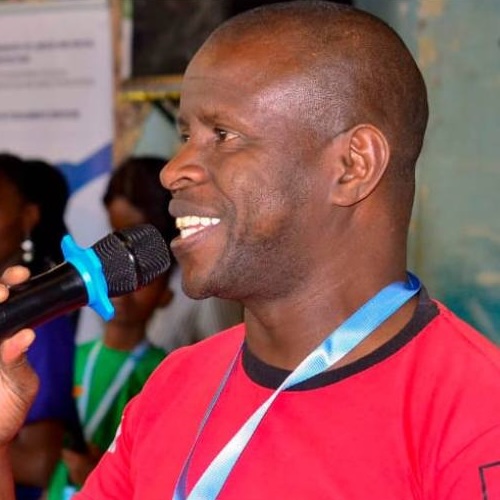A decade on death row in Kenya
Posted
Time to read
At the age of 19, I was sentenced to death for an offence that I didn’t commit. I was convicted of robbery with violence, which in Kenya meant a mandatory death sentence, regardless of the circumstances.[i] I had never been in prison before or been arrested, and I didn’t know how the judicial system worked: when I found out in the courtroom that I could be sentenced to death, I fainted in the dock. I thought, “Am I going to be killed for nothing?” Even today, I can still recall that day so clearly in my mind.
Once I was sentenced to death, I was certain that I would be executed. I was just waiting for my death. Although Kenya has not carried out an execution since 1987, I knew that the President could decide to resume executions any day. From my cell on death row, I could see into the execution room and could see the rope used for hangings. When I first arrived there, I met other prisoners who had been there for over 20 years, who still thought that they might be executed at any time. The question of whether I would be executed tormented my mind.
The conditions on death row were incredibly harsh, almost inhuman. I was detained in a tiny cell together with 10-12 other people, with no blankets or mattresses. Because of the lack of space, we would take it in turns to sleep in six-hour shifts, and at some points the cell was so crowded that some people had to stand all night. We were only allowed out for two 15-minute blocks each day, and the only toilet was a bucket hanging in the window. We had one set of clothes, and we didn’t even have toothpaste, so we would brush our teeth with soap.
The prison wardens were brutal. They spoke to us very harshly and treated us unfairly. They would beat us without mercy for making the smallest of mistakes, or for no apparent reason at all. Sometimes they would deny us the right to leave the cell for the 15-minute blocks, and tell us: “You have been sentenced to suffer death, so you can die in there.” They would even pretend that executions would be starting, telling us: “We are going to kill you tomorrow, you are going to die” - just to instill fear in us.
Because of these conditions, I saw other prisoners die. Some people died from stress because of the depression caused by death row; some died of starvation because food was very scarce; others died from tuberculosis, after sleeping on the floor in the cold. If you became ill, the wardens wouldn’t take you to hospital, because they perceived death row prisoners as violent and didn’t want to take the risk of allowing us out. On one occasion, a man died next to me, and his body was left in the cell for two days before it was taken away. But our situation was so extreme that although I was sad that he died, I was also happy because it meant that I could eat his uneaten food.
The death penalty in Kenya is literally a mental torture. It torments you and your family. The suffering is so severe, waiting for something that isn’t going to happen, that prisoners would demand to be executed. Some prisoners would even provoke a prison warden so they would be beaten, because they wanted to die. Even for me, it reached a point that I just wanted to die. I had no hope at that time. I attempted suicide twice, but I was saved by my fellow prisoners.
In 2009, after I had been on death row for almost 10 years, President Mwai Kibaki commuted the sentences of all 4,000 death row prisoners. My sentence was commuted to one of life imprisonment. I had no idea that this news was coming - it seemed like the president just woke up one day and decided on it. I wasn’t happy with the sentence of life imprisonment, because after being stuck on death row, where no executions were being carried out, this sentence still seemed like I would die in prison. I was finally released many years later, after a total of 21 years in prison.
Once I was released, I was determined to use my voice to speak about my experiences, because there is a lot of stigma against death row prisoners. The public think that if you’ve been sentenced to death, you must be a bad person. Some will not trust you fully, and former prisoners are sometimes blamed for crimes that they didn’t commit. Starting life again is very hard. Some former death row prisoners are living very isolated and impoverished lives, or move away to areas where they don’t know anyone just to escape the stigma. This stigma is partly driven by confusion about how the death penalty system works. People ask: “We heard that you were hanged to death, why are you not dead?”
Because I’ve been on death row, when I share my experiences, I’m storytelling, and it changes people. I now work as a volunteer with the NGO Crime Si Poa, engaging with young people to change their mindsets towards crime and to mentor them. When I left prison, I wanted to be the last young person to be in prison for that period. I thought: if I can change one young person by sharing my story, then I’ve changed the whole world. There is a lack of knowledge about the death penalty among the public, but when people hear about my experience, they understand what the death penalty is.
There have been some improvements to conditions on death row in Kenya since I was first imprisoned, but despite this, today’s death row prisoners are still in prison and facing the death penalty: they face the same mental torture, fearing that they are going to die. All I hope for is for this punishment to be totally abolished. There is no reason to torment people with something which does not even happen. Kenyans need to understand the reality of death row, because they are the ones who are going to decide on whether it should be abolished or not. But it can only be changed if people like me are given the platform to talk on behalf of those in prison who can’t speak for themselves.
 | Willis Nandi is a volunteer with the NGO Crime Si Poa and was formerly a death row prisoner in Kenya. |
[i] In the case of Muruatetu v Republic (2017), the Supreme Court of Kenya held that the mandatory death penalty was unconstitutional. However, in 2021, the Supreme Court issued directions stating that the Muruatetu ruling only applied to the offence of murder. There is now a lack of clarity over whether the death penalty is mandatory for the offences of robbery with violence and attempted robbery with violence. For further details see the DRPU’s Q&A interview with Chris Kerkering of the Katiba Institute.
Share
